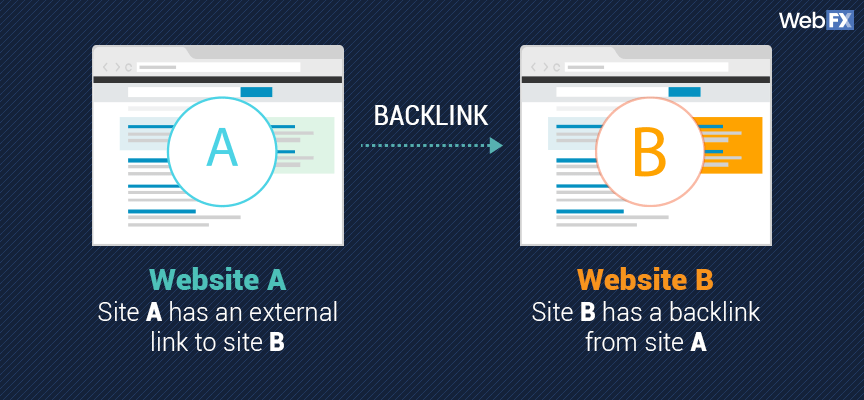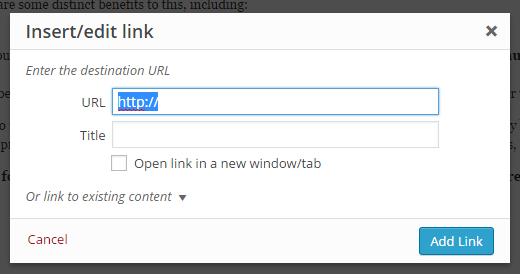
Home// Internet Marketing// What Are Backlinks?
Backlinks serve a critical role for users, search engines, and businesses. What are backlinks? A backlink is when one website links to another, like when a blog listing the best smartphones links to each smartphone manufacturer’s (think Google, Apple, and Samsung) website.
With backlinks:
- Users can explore related content
- Search engines can discover new content on the web
- Search engines can enhance their search results
- Businesses can improve their search engine optimization (SEO)
Of course, if you’re researching backlinks, you’re probably curious about backlinks and SEO. In this guide, you’ll learn everything you need to know to get started with backlinks, from how they work to how to earn them.
Keep reading to learn more about backlinks and backlinking. If you need professional help with your link building strategy, contact WebFX online or call us at 888-601-5359 to learn how our SEO services can establish an authoritative, high-quality backlink profile for your business.
What is a backlink?

The definition of a backlink is a link from one website to another. In most cases, when talking about backlinks, a backlink is a link from another site to your site. Backlinks are also known by a few different names, including hyperlinks, incoming links, inbound links, or just links.
[Video] What are backlinks? (And how to earn them)
Learn what backlinks are and how to get started with backlinking in this video.
Why are backlinks important?
Backlinks matter for a few reasons, including:
- Backlinks help search engines find and index your content for search results
- Backlinks help users explore the web and discover content related to their interests
- Backlinks help search engines interpret the quality and authoritativeness of sites and content
The “World Wide Web” was named as such for a reason: With its series of pages and websites connected by links, it really does resemble a web. Links add context, and tell the “spiders” that crawl the Internet that there are more pages to be found through the backlinks that exist there.
Let’s say you have a brand-new website.
No one links to it, and you don’t submit it to Google, either. How do you expect it to be found?
You can’t!
However, if someone links to your site, a search engine spider can crawl through that link, discover your site, and index (or make findable) your newly created content. This is one reason that backlinks are so important: Without them, search engines won’t know that your content is there, nor will users.
How are backlinks and SEO related?
In the context of search engine optimization, a backlink is an important factor in determining how well your pages rank. In fact, in 2016, a Google team member confirmed that backlinks serve as one of Google’s top three ranking factors.
Generally speaking, the more relevant, high-quality backlinks you have pointing at your website, the better you will rank in searches for your targeted keywords. So, it is desirable to have these kinds of backlinks, because ranking highly can increase your traffic, purchases, conversion rate, and so on.
This doesn’t mean that you should go out and try to acquire links from every powerful-looking website on the Internet.
Google’s algorithms are so complex that a link’s relevance will be just as important as its source. So while it may feel good for your pet supplies store to get a link from your friend’s popular marketing blog, it may not help you rank any better.
How to get backlinks to your website
Getting backlinks to your site isn’t always quite as simple as creating content or doing something newsworthy and waiting for the links to roll in. If you are a new company, or are still working on scaling your website traffic, you’ll need to do some work to get backlinks from other sites.
Here are a few easy ways that you can gain links to your site:
- Set up Google Alerts for your brand or business name. If you spot a mention of your company on a website that doesn’t include a link, send a friendly email asking for one.
- Pitch a story about something you’ve done recently to your local newspaper. Chances are good that they’re probably looking for an interesting piece of news, and local success stories are always a big hit.
- Find a website or blog looking for guest contributions from industry experts. If you can write authoritatively about the topic in question, send them a pitch. You can include a link to your website in your author bio, or in the body of your contribution, as long as it’s relevant.
- Create an engaging infographic and pitch it to multiple websites. They’ll attribute your site, which can be a powerful backlink if you get the graphic reposted somewhere popular!
- Link someone else first. This might sound backwards, but if you include a link to someone’s content or mention them in one of your own pages or blog posts, they may notice, become aware of you, and later return the favor.
- Target competitor links. Using a tool like Ahrefs, you can assess the backlink profile of your competitors. See which high-quality and relevant sites link to your competitors, and then pitch your content to those sites (if it makes sense) to earn backlinks.
- Pitch your content as a solution to 404s. Broken links or 404s can serve as a quick win for building backlinks. Run potential sites for backlinking in a tool like Screaming Frog to discover 404s. If you have comparable content, pitch it to the site owner or writer.
It’s very important to stay up to date with Google’s Webmaster Guidelines when building backlinks.
For example, Google previously handed out manual penalties to websites with “unnatural outbound link” profiles. This was a direct follow-up to the warning they had sent out weeks earlier, telling bloggers to disclose free product reviews and nofollow any outbound links regarding the product in question.
This practice of trading a free product for a review has long been utilized by some SEOs, although it’s always fallen into a rather gray area of Google’s guidelines. The penalties Google leveraged to those who didn’t heed their warning demonstrate how important it is to keep up with Google news.
Penalties can result in total or partial de-indexing of your content, which is detrimental to organic traffic.
3 tactics you shouldn’t use to get backlinks
Since link building sounds like a lot of work—and it is—and you know that backlinks are important for SEO, you may want to buy backlinks, or use some kind of backlink service to generate and populate these links with software. Is this a good idea?
No. Three tactics that you shouldn’t use for backlinking include:
- Buying backlinks
- Using a backlink software
- Trying a backlink generator
While we’re all about working smarter, buying backlinks is not what we mean when we talk about marketing automation.
There are two important reasons you should do your link building by hand:
- Buying links is a violation of Google’s Webmaster Guidelines, and may result in your site being penalized and removed from search engine results
- When you buy links, you never know what kind of quality you’re going to get, which may lead to your website being penalized anyway
Cheap backlinks are usually cheap for a reason, and buying backlinks will get you nowhere fast.
Instead of buying your links, you should take the high ground and either set aside the time to create a link building program with a dedicated employee, or hire an experienced SEO firm to build links for you through the use of high-quality content assets and outreach.
Trust us: There is no “cheap and easy way” to acquire hundreds of high-quality links to your site, unless you happen to have a piece of content go massively viral. If you buy backlinks, you may very well be gambling with the future of your business.
How to link from your website to another site
If you want to backlink someone else, the easiest way to do is through your website’s CMS, or content management system. Chances are good that you use a CMS to manage all the content on your website, including your pages, images, text, and products (if you run an ecommerce store).
Adding a Link With Your CMS
To add a link to another site using a CMS, edit the page where you want to include the link. Type out the text you want to be linked, then use your cursor to highlight it. Look for a tool button that resembles a metal link, like this:
Click the button and you should see a window similar to this one:
Add the URL of the site or specific page you want to link, then click “OK.” The link will be added to your page. You can then add any additional links you want, and save the page when you are finished. Any links you add through your CMS will be visible and clickable to website visitors.
Adding a Link With HTML
If you aren’t using a CMS, you can link to other websites using HTML. Creating a link in HTML is very easy. For example, let’s say you wanted to replicate this link, which points to our homepage. This is the HTML you would use to do so:
There are a few ways you can modify HTML links that a CMS might do automatically. For example, clicking the “open link in new window” (or, more recently, “new tab”) option in a CMS would change our link above to look like this:
… where the blank target attribute forces the clicked link to open in a new window or tab.
You can also add titles and descriptions to links with HTML. If you would like to learn more about how to create links with HTML, this W3 Schools article is a great resource.
Earn high-quality backlinks ethically with professional SEO services
Do you need help building quality backlinks to your site? As an experienced SEO firm, WebFX can create a custom link building plan for your company that boosts your presence in search, improves your SEO, and increases your site traffic.
Browse our SEO services now. Or, contact us online or call us at 888-601-5359 for a custom proposal!
Need help building quality backlinks to your website? Call WebFX at 888.449.3239 or contact us online for a free quote on our link building and SEO plans.

